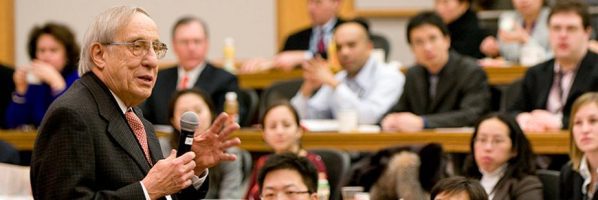Don Jacobs, Visionary Former Kellogg Dean, Passes Away at 90

Some sad news out of Northwestern University’s Kellogg School of Management — Don Jacobs, Kellogg’s dean from 1975 until 2001 and professor of finance since 1957, recently passed away. Continue reading…
What Makes an EMBA Worth It? Students, Alumni Share Their Thoughts

In an interview with the Financial Times, five EMBA students and alumni spoke about the most important lessons they learned during their time in school. They covered a variety of topics including how the alumni network has helped them, the advice they would give to a new EMBA student, and what they learned from their classmates. In this article, we’ll provide a brief overview of a few of the most valuable tips.
Cultivate Your Global Network
For Idara Umoh Nickelson, an ’17 EMBA graduate at Northwestern’s Kellogg School of Management, the main opportunity she seized was to cultivate the global network that she was exposed to. This network, which spanned five campuses and four countries (United States, Canada, Germany, and Hong Kong), provided her with a range of valuable advice including “don’t feel guilty about the time you will spend on yourself.” This advice helped her learn to take advantage of every opportunity during her schooling, which helped her land a job in healthcare—her passion.
Use Your EMBA to Your Advantage
Casey Worthington, an ’19 EMBA student at Cornell Johnson, had a busy role in IT as a consulting-based project and program manager. It was a challenging position, but he wanted more; in particular, he wanted to move into a business leadership role. The EMBA allowed him to head in that direction while still balancing his family life and work. Post-enrollment, he accepted a dream job, and to Worthington, it was the EMBA that gave him the advantage.
Tailor Your Journey
There’s a lot of different advice that Blair Wood, an ’18 EMBA student at the London Business School, would give to aspiring students, but his main advice is to tailor your EMBA to your journey. “Be guided but not overly influenced by others . . . there is a relatively narrow window to maximize a valuable and rare chance for personal growth,” he told the Financial Times. “You need to explore the vast array of opportunities, find the blend that suits you and do things at your pace.”
Learn About Other Perspectives
For Krystal Bojan, an ’18 EMBA student at Columbia Business School, London Business School, and the University of Hong Kong, her experience has been about learning from a variety of different cultures and nationalities. Having an immersive educational experience around the world, Bojan has had to learn how different locations have different styles of communicating, problem-solving, and influencing. For example, she told the Financial Times: “Working for western multinationals where the culture was non-hierarchical, I was accustomed to approaching people directly to get things done. In Asia, it is strongly driven by carefully cultivated relationships and networks of influence, or ‘guanxi’.”
To read additional advice from each EMBA student or alumni and to see what an EMBA alumni from Melbourne Business School had to say, read the full article in the Financial Times.
Getting Your Money’s Worth: The Return on Investment of the Chicago MBA

Although a growing number of business schools throughout the country are offering part-time or Flex MBA programs, many ambitious business students still choose to pursue their education full-time. However, the often high price of tuition combined with two years of lost income can be a huge deterrent in students choosing a full-time MBA program.
Although the thought of taking two years off from a career may be daunting—especially when it comes to a quickly growing city like Chicago—prospective MBAs should also keep in consideration one of the benefits of having an advanced degree: a salary bump. Considering this, students can better evaluate the true return on investment (ROI) program full-time MBA and make smart decisions about where their money will go farthest.
Don’t let the high price tags of MBA programs in a major business city Chicago scare you away. Below are the Chicago business schools that offer students the best ROI.
Kellogg School of Management – Northwestern University
Northwestern University’s Kellogg School of Management boasts one of the highest ROI’s in the world, ranking fourth overall among the world’s best business schools on Forbes recently released list of the best full-time MBA programs in the U.S. Forbes‘ ranking is weighted specifically by how well compensated graduates are several years after earning an MBA.
Forbes ranking notes that 2012 MBA graduates are now making an average of $84,800 in their return on investment. While several business schools will often have a higher-level of compensation for in-state residents because of tuition differences, Kellogg tuition rates remain constant for both in and-out-of-state applicants. On average, students earn around $80,000 per year prior to enrollment, which increased to an astounding average of $196,000 just last year. Most grads pay their entire tuition back less than four years after graduating.
YOU MAY ALSO LIKE: Kellogg Launches 10 New Courses
Booth School of Business – The University of Chicago
In 2016, the Booth School of Business at the University of Chicago topped the ValueWalk list for having the highest return on investment in the world. Comparing the relatively low cost of a Booth MBA (around $65,000-70,000) with graduate salaries of up to $150,000 or more, Booth graduates will have paid for their degree twice over by the time they have completed their first year of work. Booth graduates are also likely to find work quickly—within three months of graduation, 98.4 percent of all MBA graduates had secured job offers. Booth alumni also find many of their post-graduate opportunities through a broad network of alumni and career support at the university. In 2016, the university was responsible for facilitating 75.2 percent of student’s new jobs.
Lake Forest Graduate School of Management
The Leadership MBA at Lake Forest Graduate School of Management current tuition is $55,600 per year. According to PayScale figures, Lake Forest MBA grads earn around $107,000 annually—a difference of over $51,000. Graduates from the LFGSM are spread throughout the globe, living in all 50 states and in 15 countries around the world. Alumni from the MBA program hold positions as CEOs of major companies, elected officials, entrepreneurs, and leaders in a wide variety of industries.
Northwestern Kellogg Launches 10 New Courses

Northwestern University’s Kellogg School of Management has just launched ten new business courses for the 2017-18 academic year, according to a recent press release.
“We are very excited to continue our tradition of curricular innovation at Kellogg, drawing on both the scholarship or our research faculty and our connections with practice,” Senior Associate Dean for Curriculum and Teaching Mike Mazzeo said.
For data-focused business studies, the school has launched the brand new Data Exploration course, taught by finance professor Robert L. McDonald, who says; “It is now common in business to need to analyze large and unwieldy datasets. We moved from calculators to spreadsheets in the 1980s and now we need to move beyond spreadsheets.” The premise of the Data Exploration course, he added, “is that students should be able to work with and analyze raw data from a variety of sources and a variety of forms, using methods that scale. We will use R, which has become one of the dominant tools in data analytics.”
Two new marketing courses have been introduced to the curriculum: Customer Loyalty, taught by Kellogg Senior Fellow Thomas O’Toole; and Ethnographic Customer Insights, taught by adjunct professor Gina Fong. On the latter, Fong notes; “Ethnographic research is not just a way to answer important business questions, but also a way to bring the customer to life inside a company, helping make the decision-making of the company more customer-centric. Knowing the insight into the customer gives the marketer the ability to anticipate what the customer needs and wants—sometimes before he or she are able to articulate it.”
Two new collaboration and leadership programs have been introduced to the MBA curriculum as well, with Strategic Communications for Organizations, arriving next winter, and Leadership Development Models & Practices, which is available now. In addition, three new Public-Private Interface courses have been or will soon be introduced by Kellogg, covering Strategic Perspectives in Nonprofit Management, Social Impact & Technology Innovation, and Decision-Making for Sustainable Business.
As well, Kellogg has introduced courses in Commercializing Innovations and the CEO Playbook for Health System Success course, both of which will be offered in the winter and spring 2018 semesters, respectively.
You can read more about the new offerings at Kellogg here.
What are the Most Common Business School Application Mistakes?

Nobody just strolls into business school and starts taking classes. Prospective MBAs must undergo a rigorous application and admission process before beginning coursework and earning credits toward an graduate degree. Continue reading…
MBA Alumni Spotlight: Eddie George – Former NFL Star

Eddie George is a true renaissance man. A triple (possibly quadruple) threat whose Midas touch has graced the disparate fields of professional football, Broadway (as Billy Flynn in “Chicago”), sports commentary, and wealth management, George is a testament to how far dogged determination, resilience, and a little moxy can take you.
After nine years with the Tennessee Titans and Dallas Cowboys, George pivoted to a career as an entrepreneur with George Enterprises, an umbrella brand that encompasses a number of ventures, including Edward N. George Wealth Management, landscape architecture firm EDGE Group, health and fitness magazine EGX Lifestyle, and domestic abuse nonprofit Visions with Infinite Possibilities.
When pressed about his staggering array of accomplishments, George told Rolling Stone, “To put yourself in a box of, ‘Well, I’m only a football player and I’m just going to stick to being in sports somehow,’ you’re not living a full human being experience.
We took a closer look at the life and career of America’s favorite polymath to understand how George parlayed his skills on the field to so many different outlets.
Early Life and Education
To say George was obsessed with football as a youngster growing up in Philadelphia would be an understatement of gargantuan proportions. In the aforementioned Rolling Stone profile, George recalls that the game was an anchor, a vector, and a lens through which he saw the world. “High school football. Little league football. Backyard football. Thanksgiving football. You name it. It was not only a passion, it was life. It was also a vehicle for me to pursue my dreams.”
George earned a scholarship to Ohio State after rushing a record 1,372 yards in his fifth year at Fork Union Military Academy. Over the course of three years at Ohio State, George surpassed and set new school records and generally continued his reign on the field. In 1995, George was recognized as a first-team All-American and won the coveted Heisman Trophy, which remains one of George’s most significant achievements. He explains, “To win the Heisman gave me the resolve that if I put my mind to it, I could do it. It taught me a valuable lesson of what can be accomplished.”
An Illustrious NFL Career
George’s nine-year career began when the Houston Oilers (currently Tennessee Titans) selected George in the first round of the 1996 NFL draft.
George’s record suggests a reliably brilliant player whose excellence is surprisingly overlooked: a ’96 Rookie of the Year Award, four consecutive Pro Bowls (1997-2000), and one Super Bowl appearance, in which George tallied two touchdowns in a nail-biting 23-16 loss to the St. Louis Rams.
After eight seasons with the Titans and one with the Dallas Cowboys, George retired in 2005. In a 2009 Kellogg School of Management profile, George spoke openly about the realities of what he could not fathom up until his very last season: a life, post-football. “Nine years goes by like this. And if you don’t take care of your money, you’re out on the street. It’s a scary feeling. You ask yourself, what’s next?”
At The Northwestern Kellogg School of Management
After retiring from the NFL, George was determined to find a way to keep moving forward but after 20 years immersed in the game, that was easier said than done, as George explained in 2009:
“I had to find something that was going to fill that void of putting my jersey on on Saturday and Sundays. One was my identity. Two, was figuring out what I would do next. Three, I had to ask myself what I was going to the next 60 years of my life to make money to maintain my lifestyle, to grow and build, and to take care of my family financially.”
George was brutally honest about his state circa 2006 in an interview with SB Nation: “To wake up and not know what you’re going to do with your time because you can no longer do the one thing that you’ve been doing your entire life, it’s daunting.”
As George explains in a Winter ’09 Northwestern Profile, “My celebrity status definitely helped open doors, but that will only take you so far.” After a few successful years at George Enterprises, he opted to attend Kellogg to “broaden and deepen his understanding of the business side.”
George was thrilled at the opportunity Kellogg gave him to reinvent and brand himself away from football. He explained in a Kellogg profile that he chose the school because of its reputation.
“Like on the football field, if I’m going to be the best at something, I’m going to learn from the best coaches, the best teachers. Kellogg resonated because of the strong branding and marketing emphasis.”
George graduated with an Executive MBA from Kellogg in 2009.
Edward N. George Wealth Management
After graduating from Kellogg in 2009 and receiving his securities agent and investment advisor licenses, George almost immediately considered how to use his business acumen in service of his fellow athletes. He told ESPN, “When I came into the league, I didn’t understand all the financial terminology. I lost some money in personal investments that I shouldn’t have. I want kids coming out of college to be more prepared for the financial side.”
George partnered with Greg Eastman, his own personal financial advisor of over two decades, and Scottsdale-based First Financial Equity Corp, to found Edward N. George Wealth Management—a boutique financial management firm that helps athletes get their finances in order via estate planning, tax planning strategies, retirement, and income planning.
Wealth management was a homecoming of sorts for George as it brought together a number of his diverse interests, according to a previous interview with the Nashville Post: “My life’s mission is entrepreneurship, entertainment and education. The wealth management firm is both entrepreneurship for me and education for the players.”
